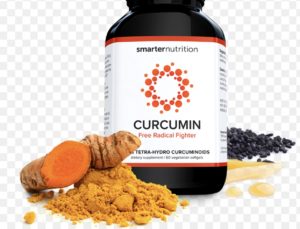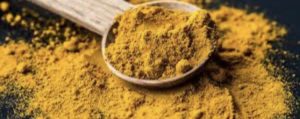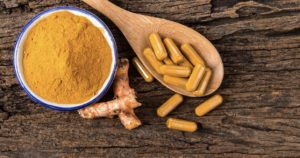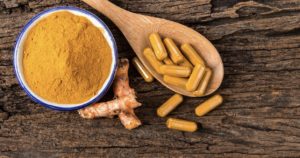Curcumin: Health Benefits of Turmeric’s Most Powerful Compound
It’s been used for more than 5000 years in traditional medicine.
It’s been written about in more than 3000 research and review articles.
The first scientific study showing benefits in human health was published in 1937.
Of all the nutrition and supplement topics I’ve read about and researched, curcumin has been one of the most fascinating. After reading this, I’m sure you’ll understand why.
Use of Curcumin
Curcumin has been used in Indian medicine for anorexia, coughs, to address diabetic wounds, support liver health, to relieve rheumatoid arthritis and normalize inflamed sinuses.[i]*
Hindu medicine has used curcumin for muscle and tendon injuries like sprains and strains. Chinese medicine has recommended the use of curcumin for issues related to abdominal pain.[ii]*
Ayurevedic medicine texts have recommended the use of curcumin for obesity.[iii] It is also recommended to help with conditions such as arthritis, trauma, ulcers, jaundice and skin issues like psoriasis.[iv]*
The first research study on curcumin related to human health benefits was published in 1937.[v] Curcumin has been shown in research to benefit a mind-boggling number of health issues since that time.
Curcumin and Inflammation
Inflammation is at the core of numerous health problems, like irritable bowel syndrome (IBS), cardiovascular disease, arthritis or dementia. Because curcumin affects the body’s inflammatory process, it seems to be beneficial in many of these inflammatory diseases.*
Signs of IBS include increased stool frequency, bloating and abdominal pain. These changes are likely cause by inflamed intestinal mucosa. In one study, a dose of just 144 mg of turmeric extract resulted in a 60 percent decrease in IBS syndromes in 105 adults.[vi]
Many inflammatory conditions cause pain. Studies suggest that curcumin may be a safe and effective way to help those with acute or chronic pain.*
A small study with individuals experiencing pain showed that a dose of 2 grams of curcumin phytosome led to significant relief. The results were even superior to acetoaminophen.[vii]* Curcumin phytosome is a specific form of curcumin used in some nutritional supplements I’ll address below.
In another study with patients with osteoarthritis, pain significantly decreased and walking performance improved with a dose of 1 gram of curcumin phytosome per day.[viii]
Curcumin and Muscle Soreness and Injury
One of curcumin’s many appealing benefits are its effects on tissue injuries.*
Most people have experienced muscle soreness the day after an intense training session. This is normal, especially at the beginning of a training program, or when training volume, intensity or other variables change.
Traditional anti-inflammatory drugs, or NSAIDs, have been shown to relieve soreness and support healthy levels of inflammation, but they have been shown to interfere with muscle growth.
Curcumin affects a different part of the inflammatory process than NSAIDs, so it should not interfere with muscle growth. But it has been shown to reduce delayed onset muscle soreness (DOMS).[ix]* The participants in this study were healthy, moderately active individuals who used 2 grams of curcumin phytosome per day.
Animal research suggests that curcumin also assists in the regeneration of muscle tissue.* This makes it appealing following injuries, reconstructive surgery or other traumas.[x]
Curcumin and Weight Management
More than 300 papers have been published about curcumin’s role in supporting weight management. Curcumin’s effect on weight management first came to light in 1973, with research showing that it could help normalize blood sugar levels.[xi]*
Curcumin has been shown to improve beta-cell function, which could be one of the reasons it improves blood sugar levels.[xii]*
Metabolic syndrome and overweight or obesity often go hand in hand. Curcumin may be valuable in both conditions as it has been shown to positively affect blood lipid levels, blood glucose and glycated hemoglobin (HbA1c), decrease fatty acid synthesis and affect many other hormonal pathways related to obesity.*
Curcumin acts on adiponectin, which may assist in normalizing body fat levels.* Adiponectin levels are usually low in overweight and obese individuals.[xiii]
Curcumin, Mood and Brain Health
Curcumin affects a number of nurotransmitters, including norepinephrine, dopamine and serotonin.
Serotonin is most known for its affect on sleep, but it plays roles in appetite, memory, learning, mood, temperature regulation and cardiovascular function. Without dopamine, people find it difficult to experience pleasure. Norepinephrine is necessary for attentiveness and focus, but is also important for supporting deep sleep and learning.[xiv],[xv]
In affecting these neruotransmitters, it may affect mood. Curcumin may also enhance brain health.*
Curcumin has ben shown to improve levels of brain-derived neurotrophic factor (BDNF). BDNF helps to stimulate the development of new brain cells.[xvi]* This effect is similar to the effects of aerobic exercise, which has also been shown to increase BDNF levels.
Also of interest, curcumin seems to stimulate vasodilation, or opening of the blood vessels in a similar way to cardiovascular exercise.[xvii]*
Curcumin and Cancer
Preclinical research has shown curcumin inhibits growth of certain cancer types.* Because of curcumin’s effect on inflammation, it may be beneficial in colorectal, pancreatic, breast, hepatic, oral and prostate cancers as well as leukemia.[xviii]*
It’s believed that curcumin’s cancer-related benefits come from its ability to affect apoptosis, or programmed cell death. This is one of the many wonders of the body. When cells become damaged enough, they’re supposed to self-destruct and die. Pretty cool!
Unfortunately, when the process of apoptosis becomes dysfunctional, these damaged cells may lead to cancer, as well as autoimmune or degenerative diseases. It is believed that curcumin may have a positive effect on cancer growth by helping the cells overcome their apoptosis dysfunction.[xix]*
Cancer patients should always talk with their doctor before using curcumin (or any other nutritional supplement) as there is some evidence that curcumin may interfere with some chemotherapy drugs.[xx],[xxi]
Other Benefits of Curcumin
Curcumin has also been shown to support normal cholesterol levels.[xxii]* In one study, those who took 10 mg of curcumin per day for 30 days saw an increase in HDL cholesterol, a drop in LDL cholesterol and increased apolipoprotein(a).[xxiii]
Curcumin also seems to limit the oxidation of LDL cholesterol, thought to be one of the primary triggers of atherosclerosis.* However, this research is based on in vitro studies.[xxiv]
Curcumin Absorption
As compelling as the research is on curcumin, the greatest obstacle is its very low level of absorption. Pure curcumin extract is not absorbed well at all, although consuming turmeric or curcumin with fat does assist in absorption. Coconut milk, butter or cooking oils may help with absorption when the spice is used in food.
In one study, a dose of two grams of pure curcumin extract was given to fasted participants to ingest. No curcumin was detectable in the blood afterwards, meaning none of the curcumin, or an extremely small amount, was absorbed.[xxv]
Those who supplement with a standard curcumin extract and maintain a low-fat diet may not experience much benefit. In fact, plain curcumin extract is probably not worth investing in. However, there are other forms of curcumin that have been shown absorb well.
As of this writing, a combination of curcumin extract wrapped in a phosphatidylcholine matrix, known as curcumin phytosome, was shown to be the best absorbed form of curcumin.[xxvi]* The phosphatidylcholine:curcumin matrix is combined in a 2:1 ratio.[xxvii] Not only is phosphatidylcholine a valuable nutrient for the brain, this lipid matrix dramatically increases the absorption of curcumin.*
Overall absorption of curcumin phytosome has been shown to be 29 times better than standard curcumin extract.
Because this is currently the best-absorbed form of the nutrient, we carry two products that include curcumin phytosome.
Rebound contains pure curcumin phytosome at a dose of 500 mg per capsule.
Multi AM/PM Complex includes a 200 mg dose in the morning formula of this high-quality multivitamin formula.
Curcumin Dosage
Curcumin has a very strong safety record. Use of levels as high as 8 grams per day have been shown to be well-tolerated.[xxvi]*
As I mentioned above, a 2 gram dose of curcumin phytosome had a positive effect on pain, and a 1 gram dose of curcumin phytosome had a positive effect on those with osteoarthritis, as well as healthy individuals with delayed-onset muscle soreness (DOMS).xxvi*
As with most natural products, different people have a different response. Also, one’s goals may dictate how much they use. If they’re looking for just a little extra antioxidant benefit, 200-500 mg of curcumin phytosome might be enough. If they use it following an injury, or to support healthy levels of inflammation, they may need more.
Personal Use
From a personal standpoint, I recently ruptured my bicep tendon while deadlifting. Knowing the value of curcumin, I stopped in LifeCafe immediately after it happened and bought an extra bottle of Rebound, which is curcumin phytosome. While I had a bottle at home already, I knew it would be wise to start taking it immediately, rather than waiting until later in the day to get home. I immediately took two grams of curcumin phytosome while I waited to see a surgeon about getting it reattached.
Between the injury and the surgery three days later, I took 8 grams per day. Following the surgery for the first couple weeks, I took 6 grams per day, along with other supplements and oils, and tapered down to 1-2 grams per day as my arm has been healing. As of this writing, I can’t specifically point at curcumin phytosome alone for my accelerated recovery, since I did use a number of other things, but I do believe it helped. From a recovery standpoint, I’m a couple months ahead of the standard recovery schedule.
My doctor also recommended I take at least one gram per day on an ongoing basis to mitigate some of the effects of chemotherapy I went through after being diagnosed with leukemia at age 5.
Thanks for reading.
If you want to learn more about curcumin phytosome, or give it a try, you can find Rebound here. You’ll also be able to get a moderate dose in Multi AM/PM Complex.
If you haven’t done so yet, be sure to.
The Original article Link.
https://www.core3training.com/curcumin-worlds-most-amazing-supplements/




https://www.facebook.com/COREomaha/ follow us on Facebook!
